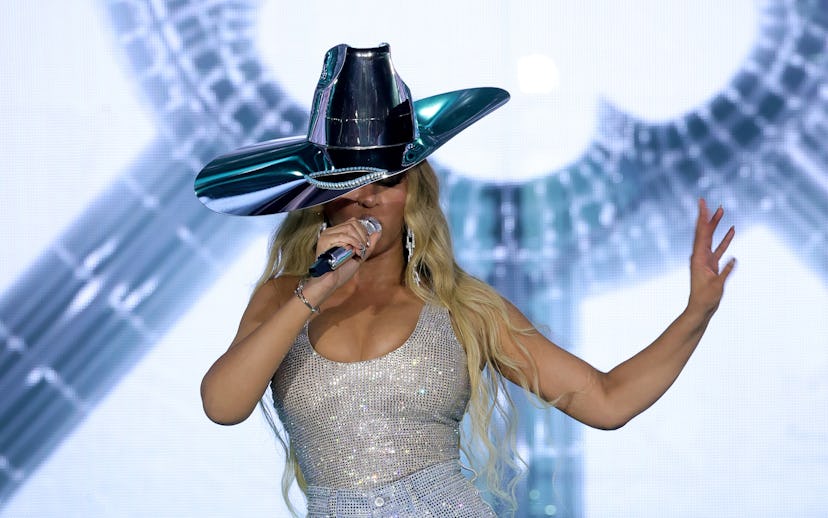
Entertainment
Beyoncé & Lana Del Rey’s Country Pivot Is Personal
Why this shift says more about them than the music industry.
For the first time in decades, country music is back in vogue. In the past two weeks alone, both Lana Del Rey and Beyoncé announced new country albums, while Luke Combs, Zach Bryan, and Kacey Musgraves are at the top of the charts. “The music business is going country, We’re going country,” Del Rey even declared in her own prescient moment during her album-announcement speech. For once, music’s mainstream current is flowing the other way: Country artists are no longer going pop. Pop is going country.
For Del Rey and Beyoncé, however, this pivot feels like a long time in the making. If you’ve been keeping up with the “A&W” singer on Instagram over the past year, you’ll know she’s been more or less cosplaying as a Southern girl. The U.S. leg of her last tour was spent circling the Bible Belt as she hopped from Franklin, Tennessee, to Austin, Texas, to Mississippi, Florida, and Alabama. She picked up a shift at Waffle House (to many raised eyebrows), and has been covering Tammy Wynette and John Denver in her live shows. And that’s not even mentioning her catalog, which has always immersed itself in motifs of manly cowboys, dusty roads, and windswept Americana since her 2012 debut, Born To Die. As for Beyoncé, well, her pivot to the genre feels even more like an inherited inevitability. The Houston native reps her Texas roots hard, and she already dabbled in the genre when she released “Daddy Lessons” on 2016’s Lemonade. A country album from Bey never really was a question if, but when.
Still, it’s curious that both these artists have chosen this moment to officially make their entrance into the genre known for authentic storytelling and a rugged, rural existence. After all, their lives are anything but. Beyoncé is an extremely private billionaire who, despite the marketing, probably hasn’t actually lived in H-town for longer than a few nights in years (the Carters’ real-estate portfolio includes multiple properties but none in her hometown). Del Rey is also a massive superstar with her own rabid fanbase and a Malibu home steps away from the ocean. But it’s likely because of their previous commercial success that they can now invest in making music that feels more intimate and niche.
Del Rey’s songwriting, specifically, has already been arcing towards esoteric, autobiographical vignettes for sometime now. Her last album, Did you know that there’s a tunnel under Ocean Blvd, spanned gospel, gothic folk, trip-hop and pop, but its spirit was all country as she paid homage to her ancestors and parents and ruminated on having a baby. As her songwriting gets even more inner-facing, it only makes sense for country to be her next frontier.
“With Del Rey and Beyoncé leading pop’s charge into country music, it may be tempting to predict a full-on shift in mainstream music.”
Similarly, while Beyoncé has historically kept the opacity level at or close to 100 in her music, her foray into country seems like it’ll offer a brief curtains-parted moment for the star. Her latest song “16 Carriages” reminisces on her childhood in showbiz while navigating a turbulent family life, and it’s one of the most intimate glimpses we’ve had into her psyche in years. Maybe, on her next album, we’ll finally get to hear her perspective on motherhood or growing older, or something equally walls-down. Sure, in comparison to other artists’ work, it’ll still be meticulously edited and presented, but even a curated look into her world is a valuable invitation.
What can’t be understated in Del Rey and Beyoncé’s embrace of country is just how much work Black and women artists have done over the last decade to push the boundaries of the industry. In many ways, the U.S. pop market’s receptiveness to the genre stems directly from the efforts of musicians like Mickey Guyton and The War and Treaty, and female artists like Kacey Musgraves, who have been able to diversify the genre beyond the long-reigning (and cliché) bro-country sound. They’ve proven that complex female narratives and the Black experience do belong, and are, in fact, the roots of country — a point Beyoncé’s will surely highlight on her new record, considering she tapped legendary Black roots musician Robert Randolph for the steel guitar on “Texas Hold ‘Em.”
With Del Rey and Beyoncé leading pop’s charge into country music, it may be tempting to predict a full-on shift in mainstream music, but the conditions of their pivot might not be so readily replicable. They’ve spent their lives working to reach a level of self-mythology where this jump makes sense — and not something they achieved by putting on a Stetson.